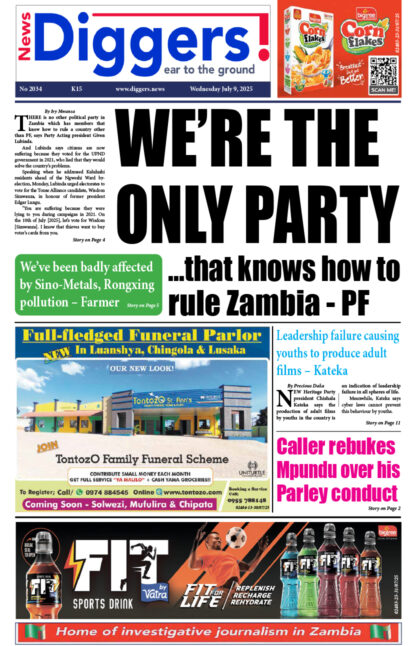The Law Association of Zambia (LAZ) has dragged President Edgar Lungu, the Attorney General and the National Assembly to the Constitutional Court for attempting to illegally alter the Constitution of Zambia through Bill 10, 2019.
LAZ which is being represented by Simeza, Sangwa and Associates has cited the President of the Republic of Zambia, the Attorney General and the National Assembly as first, second and third respondents, respectively.
Meanwhile, Simeza, Sangwa Advicates has written to the Speaker of the National Assembly Dr Patrick Matibini, informing him that Amendment Bill No.10 should not be discussed any further in the House, as it is before court.
In this matter, LAZ has petitioned the Constitutional Court seeking a declaration that the respondents’ decision and the extent to which it seeks to amend the Constitution in the manner set in the Constitution of Zambia (Amendment) Bill No. 10 of 2019, is illegal because it contravenes Articles 1(2), 8, 9, 61, 79, 90,91, 92 and 79 of the Republican Constitution.
The Law Association further seeking an Order (of Certiorari) that the Petition be allowed and that the Constitution of Zambia (Amendment) Bill No. 10 of 2019, which evidences the Respondents’ decision to amend the Constitution in the manner provided therein, be removed forthwith into the Constitutional Court for purposes of quashing.
LAZ is further seeking any other remedy the Court may consider just in order to defend the Constitution and resist or prevent its overthrow, suspension or illegal abrogation, among other reliefs.
The subject matter of LAZ’s Petition, which has been made pursuant to Article 128(3)(b) of the Constitution, is challenging the decision by: President Lungu to amend the Constitution of Zambia in the manner set out in the Constitution of Zambia (Amendment) Bill No. 10 of 2019 (Bill 10); the decision by the Attorney General to sign and present to the National Assembly, Bill 10, to amend the Constitution in the manner provided in the said Bill; and the decision of the National Assembly to publish in the Government Gazette, Bill 10, to amend the Constitution; and the National Assembly’s decision of August 2, 2019, to table the Bill for the First Reading.
In a petition filed in the Constitutional Court, LAZ highlighted specific decisions that offended the Constitution, such as changing the electoral process, the decision to alter the Constitution that undermine the Judiciary and increase the powers of the President, among other decisions.
LAZ contended that the respondents’ decision that a presidential candidate who has failed to secure more than fifty per cent of the votes cast to team up with another presidential candidate so that their combined votes exceed fifty per cent to form a coalition government instead of going for a second ballot, was illegal because the said decision contravenes different articles of the Constitution.
“The said decision contravenes: Article 61 of the Constitution, which requires the legislative authority of the Republic to be exercised in a manner that protects the Constitution and promotes democratic governance of the Republic; Article 90 of the Constitution, which requires the President to exercise the executive authority of the Republic in a manner compatible with the well-being and benefit of the people; Article 91(3)(a) of the Constitution, which requires the President, in the exercise of the executive authority of the State to respect, uphold and safeguard the Constitution,” read the petition among other articles.
LAZ further contended that the Respondents’ decision to the extent to which it seeks to repeal Article 111(3) of the Constitution, which provides that a person who has twice held the office of Vice-President shall not be selected as a running mate, and Article 111 (6) of the Constitution, which provides that the person who assumes office as Vice-President, in accordance with clause (5), shall serve for the unexpired term of office and be deemed for the purposes of clause (3) to have served a full term as Vice-President if, at the date on which the Vice-President assumed office, more than three years remain before the date of the next general election; or not to have served a term of office as Vice-President if, at the date on which the Vice-President assumed office, less than three years remain before the date of the next general elections, was also illegal.
LAZ stated that the Respondents’ decision to amend Article 103 of the Constitution seeks to change the time in which the Constitutional Court may hear and decide an election from 14 days to 30 days and the time within which a fresh election can be held where the election of the President-elect has been nullified by the Constitutional Court from 30 days to 60 days from date of nullification, was illegal because it contravenes Article 61 of the Constitution.
“Article 61 of the Constitution requires the legislative authority of the Republic to be exercised in a manner that protects the Constitution and promotes democratic governance of the Republic: Article 91(3)(a) of the Constitution, which requires the President, in the exercise of the executive authority of the State to respect, uphold and safeguard the Constitution; and Article 91(3)(f) of the Constitution, which requires the President in exercise of the executive authority of the State, to uphold the rule of law,” read the petition further.
LAZ contends that the Respondents’ decision to amend Article 103 of the Constitution to limit the right to challenge the outcome of the Presidential election to the losing candidates was illegal because it contravenes: Article 61 of the Constitution, which requires the legislative authority of the Republic to be exercised in a manner that protects the Constitution and promotes democratic governance of the Republic.
“Article 91(3)(a) of the Constitution requires the First Respondent, in the exercise of the executive authority of the State to respect, uphold and safeguard the Constitution; Article 91(3)(e) of the Constitution requires the First Respondent, in the exercise of the executive authority of the State, to promote and protect the rights and freedoms of the persons,” read the petition.
Meanwhile, LAZ contends that the decision by the Respondents to alter the Constitution by repealing with re-enactment and repealing without re-enactment, Articles 63, 68, 69, 70, 71, 72, 78, 81, 83, 84, 107, 113, 114, 117A, and 199 of the Constitution, to the extent that the said decision seeks to undermine the powers of the Parliament and increase those of the Head of State, is illegal in that it contravenes Article 79 of the Constitution because by making the said decision the Respondents want to undermine the ability of Parliament and the Judiciary to check on the President in the discharge of the executive functions of the Republic.
And in a letter addressed to Speaker of the National Assembly Dr Patrick Matibini, Simeza, Sangwa Advocates advised against proceeding with debating Bill number 10 which passed First Reading August 2, 2019 while the matter was pending in court.
“Dear Mr Speaker, it has always been the tradition of the National Assembly not to debate or discuss matters that are before the courts of law. Since the subject of the said petition is the Constitutionality of the decision by the respondent to amend the Constitution of Zambia in the manner set out in the Constitution of Zambia (amendment Bill No.10 of 2019; is the Honourable Mr Speaker in a position to undertake, in lieu of the petitioner moving the Constitutional Court for an interim order restraining the National Assembly from considering the said Bill, that the National Assembly will not, whilst this matter is pending before the Constitutional Court, continue with the legislative process to enact the said Bill into law? Mr Speaker, we would be grateful to receive a response to these representations within seven days from the date of the letter,” read the letter.




















One Response
2021 is the only answer